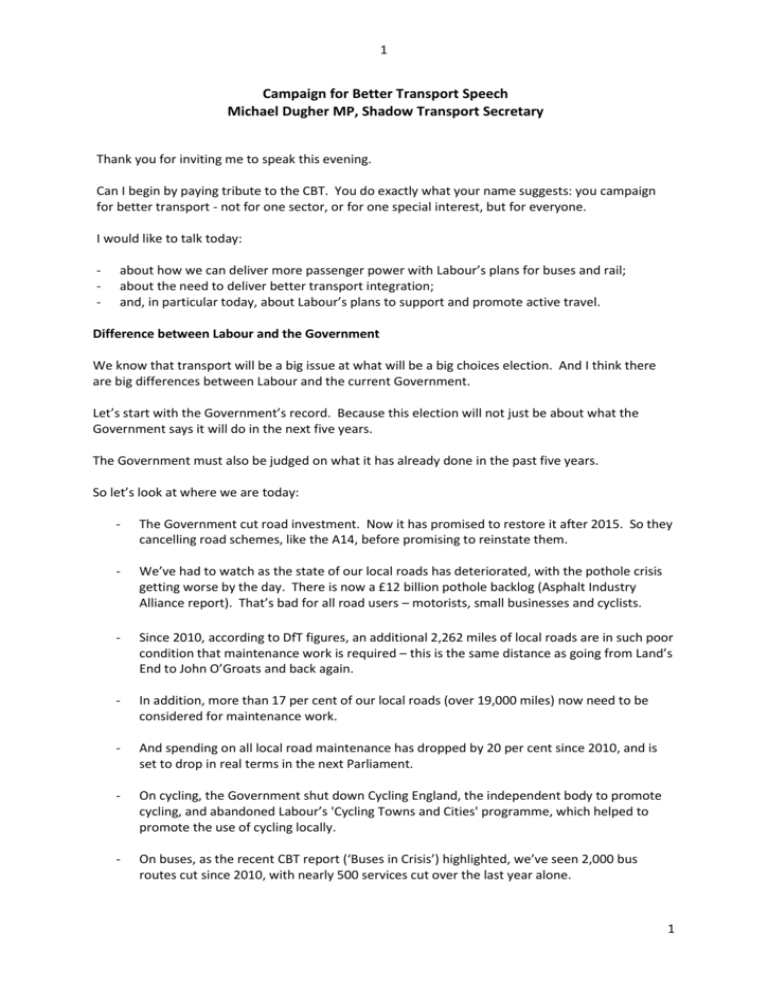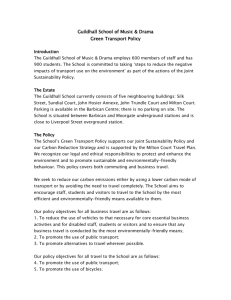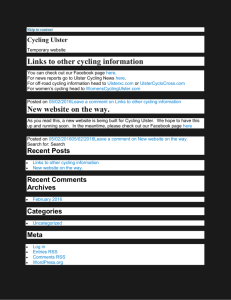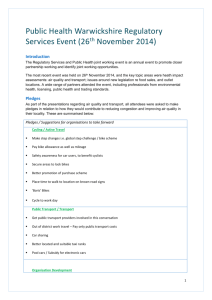Campaign for Better Transport Speech Michael Dugher MP, Shadow
advertisement

1 Campaign for Better Transport Speech Michael Dugher MP, Shadow Transport Secretary Thank you for inviting me to speak this evening. Can I begin by paying tribute to the CBT. You do exactly what your name suggests: you campaign for better transport - not for one sector, or for one special interest, but for everyone. I would like to talk today: - about how we can deliver more passenger power with Labour’s plans for buses and rail; about the need to deliver better transport integration; and, in particular today, about Labour’s plans to support and promote active travel. Difference between Labour and the Government We know that transport will be a big issue at what will be a big choices election. And I think there are big differences between Labour and the current Government. Let’s start with the Government’s record. Because this election will not just be about what the Government says it will do in the next five years. The Government must also be judged on what it has already done in the past five years. So let’s look at where we are today: - The Government cut road investment. Now it has promised to restore it after 2015. So they cancelling road schemes, like the A14, before promising to reinstate them. - We’ve had to watch as the state of our local roads has deteriorated, with the pothole crisis getting worse by the day. There is now a £12 billion pothole backlog (Asphalt Industry Alliance report). That’s bad for all road users – motorists, small businesses and cyclists. - Since 2010, according to DfT figures, an additional 2,262 miles of local roads are in such poor condition that maintenance work is required – this is the same distance as going from Land’s End to John O’Groats and back again. - In addition, more than 17 per cent of our local roads (over 19,000 miles) now need to be considered for maintenance work. - And spending on all local road maintenance has dropped by 20 per cent since 2010, and is set to drop in real terms in the next Parliament. - On cycling, the Government shut down Cycling England, the independent body to promote cycling, and abandoned Labour’s 'Cycling Towns and Cities' programme, which helped to promote the use of cycling locally. - On buses, as the recent CBT report (‘Buses in Crisis’) highlighted, we’ve seen 2,000 bus routes cut since 2010, with nearly 500 services cut over the last year alone. 1 2 - We’ve seen bus fares rise by an inflation busting 25 per cent – that’s five times the growth in average wages. - We’ve now got over 30 million fewer miles of local bus services compared to 2010. - And like with our buses, we’ve seen the Government allow train companies to hit passengers with inflation busting fare rises of 20 per cent on average - that's four times the rise in average wages. - Our railways are now 40 per cent more costly than in other European countries. - We’ve also had the West Coast franchise fiasco, which cost the taxpayer over £50 million. And nearly £300 million has been wasted due to the Government temporally extending poorly negotiated train contracts that operate within the current franchise model. - Passenger Focus has said that we’ve seen overall passenger satisfaction fall since 2010. - We’ve also seen the percentage of passengers satisfied with punctuality fall since 2010. - And we’ve seen the percentage of passengers satisfied with value for money fall over the same period. - Across the board, passengers are saying the service they receive is getting worse. - And, finally, we had the rail chaos over the Christmas period, which caused massive disruption and delays for thousands of passengers. Both Network Rail and the ORR released critical reports and it also came to light that Ministers were warned well ahead of time that passengers were likely to suffer – and that they failed to act. Labour’s Reforms: “Passenger Power” So with Transport there will be a clear choice at the next election. It’s a choice between ‘more of the same’ or big changes with Labour. That’s why Labour is planning the biggest reforms for a generation – changes that are necessary to improve services and deliver more passenger power to communities. Rail Let’s being start with rail. Firstly, we need to take action on fares. People are understandably getting tired of being ripped off. So we will: - introduce a strict cap on fares on every route by eradicating the so-called 'flex' that allows the private train companies to introduce the inflation busting fares; - simplify ticketing – reducing confusion over complex ticketing arrangements; 2 3 - and create a new legal right for passengers to the cheapest possible ticket for a journey. Secondly, it is clear that the existing franchising system is not fit for purpose. So I have said that a future Labour government will put the franchising system, as it stands today, in the bin. And we’ll conduct a full but speedy review to ensure that we get a better deal for taxpayers and passengers. Thirdly, we will scrap what I think is the rather ironically named Rail Delivery Group. This is the body that supposedly runs the railways, but in reality is just an industry stitch up acting on behalf of Network Rail and the train operators. Instead, we will institute a new governing body for the railways, which will have, for the first time, a strong passenger voice at its heart. It’s time for passengers to be heard and for train operators to be properly held to account. And lastly, and this is really important, we will legislate to allow a public sector operator to take on and challenge the private train companies to run sections of our rail network. What happened with East Coast epitomises the Government’s approach – putting privatisation first, and the passenger and the public interest last. The public operator, Directly Operated Railways, successfully operated the East Coast service, achieving record performance and passenger satisfaction, whilst investing in services and delivering below average fare increases. But despite this impressive record, the Government pursued an ideologically driven, politically rigged timetable to ensure that the East Coast franchise would put back into the private sector ahead of the General Election in order to try and kill off the very idea of having a public sector operator. The absurdity of the process was characterised by the Government allowing every other train company in the world, including the European state operators, to compete for the service. So the only people barred from even bidding were the very people who were running the service well today. Why? Because they were both British and public sector. That’s a nonsense. Buses But we also need to see passenger power in how our bus services are run. Buses really are the lifelines of our cities, towns and villages. Yet our local bus services have worsened over the last five years as David Cameron has just stood by as private bus operators, like my friends at Stagecoach, have cut vital services and raised fares. Like the energy market, the bus market is clearly broken - nearly 70 per cent of the bus market is run by just five firms and all the power lies with these companies – not with the communities they are supposed to service, and certainly not with passengers. 3 4 That’s why Labour has said we will regulate the bus market, handing power to local communities and passengers. City and county regions should be able to negotiate a comprehensive Quality Contract with bus companies that will ensure operators not only get to run the most profitable routes in the area, but also have to run routes that are vital for local communities as part of the overall deal. This is how it works in London. And if it’s good enough for London, it’s good enough for other English regions. Why shouldn’t other regions be able to determine routes, set fares and integrate bus services? I have been willing to sit down and engage with the bus operators, but you many have noticed the one company in particular is especially opposed and that’s Stagecoach, who have chosen to launch political attacks on Labour’s bus policy. It was even put to me recently that my policy many not be in the interests of Stagecoach’s shareholders. Well I am very clear. I have one clear duty and that is to the taxpayer and the travelling public. We will not be deterred by their scare mongering, threats and the appalling way they have treated people in the North East, where they have threatened the local transport authority with pulling their buses off the road, simply because they want to draw up a Quality Contract. Transport Integration / not either or Ultimately, Labour’s reforms will mean that local communities will get the power to set vital bus routes and integrate their services. And these two areas, which go hand-in-hand, are key to many of the reforms we are looking at – proper devolution and better integration of our transport systems. Transport integration is far from what it should be in many parts of the country. Services are too often disconnected with the absence of integrated ticketing and co-ordinated timetables. These holes in the system just put barriers in the way of allowing people to access public transport. To improve this, I believe that we all need to start looking at transport more in terms of networks rather than isolated or even competing modes. I’ve been Shadow Transport Secretary for over four months now and have been contacted by many different transport organisations putting their case forward – and rightly so. But too often we see organisations pitching themselves against one another, even though their aims are not always mutually exclusive. Some people in the transport world have a tendency to forget, or just ignore, the fact that the travelling public use a network and more than just one form of transport to get around. 4 5 We are often presented with a false choice between different types of people who use different modes of transport. But to move forward in a sensible way, we must reject the politics of pitching one transport mode against another. This is the view that if you are pro-cyclist, you must somehow be anti-car, rather than everyone identifying as road users. As we all know, the truth is people are not either just a cyclist or just a motorist. Or just a train commuter or just a bus user. What about the commuter who cycles to the station and then gets on a train to go to work? Or the person who drives to a Park and Ride, before getting the bus into town? Interestingly, the latest RAC Motoring report revealed that: - 65 per cent of people who use their car also get the train at least 1 to 3 times per week; - 90 per cent of people who use their car also walk at least 1 to 3 times per week. - And 67 per cent of people who use their car also get the bus at least once a week. When developing transport policy, we can’t be in denial about peoples’ transport realities. We want people to be able to make better choices. But we have also got to elevate the terms of the debate. Integrated transport – local communities deciding What we should really be talking about is how we can create the smooth door to door journeys we all want – and how we can give people more travel choices. Door-to-door journeys need to be seamless with proper connections, a single ticket or smartcard, good interchanges and easily accessible information. But we are a long way from having all of these throughout the UK. The experience from across Europe is that there are significant benefits from enabling rail services to be properly integrated into wider local and regional transport planning. Too often decisions on local rail services, buses and parking are made independently when better coordination could make more effective interchanges. While the Oyster card in London has transformed local travel, enabling flexibility between modes of transport, maximum daily charges and the ability to integrate concessionary schemes, the rest of England lags behind. It is clear that the rest of the country should also be able to benefit from similar schemes – but for this to happen, we must give transport authorities the ability to plan and manage services across modes. 5 6 [We have seen in the Netherlands, for example, how stations can become real community hubs, integrating rail and bus services and the provision of secure cycle storage facilities, often staffed and combined with repair and maintenance services.] Green transport And, vitally, on top of all the other benefits, joining up different ways of travelling is fundamental to green transport. Not just bikes and trains, but better bus interchanges, better car parking at stations, encouraging people to leave the car at home or to use it for only part of their journey. The latest figures show that for all the short journeys made by car – 11 per cent are under a mile, 29 per cent are between one and two miles, and the remainder (60 per cent) are between two and five miles. Driving these short journeys is costly both to drivers and to society in terms of the impact on our pockets, wider economy and environment. If drivers switched just one in 25 car journeys to bus or coach, or if they switched just one journey a month, it would mean one billion fewer car journeys and a saving of 2 million tonnes of CO2. The RAC has said that nearly 60 per cent of motorists would drive less if public transport was better in their area. So the challenge is to offer people better choices. I’m not going to demonise people who need to use their car, but I do want to see fewer people driving for short journeys. The way to achieve this must be about providing good quality alternative public transport at the right price. And it is about encouraging the use of active travel. Active Travel Which brings me to the next issue I want to address: how we can best promote active travel in our communities. Labour made progress in Government. Our Cycling Demonstration Towns increased cycling by a third, and Sustainable Travel Towns saw significant growth in travel by bike and foot. But the interests of pedestrians has just been ignored over the last five years. I was told recently how Downing Street simply deleted the word ‘walking’ from their announcement that was meant to be about cycling AND walking strategy. The Conservatives and Lib Dems have similarly failed to deliver their so called ‘cycling revolution’. Just 2 per cent of overall journeys are made by bike. And walking accounts for 22 per cent of all trips, a 30 per cent decrease since the mid-1990s. And just last month, Ministers only caved in at the last minute and supported adding the need for a long-term Cycling and Walking Strategy into the Infrastructure Bill after sustained pressure from Labour and backbenchers. 6 7 We clearly need a different approach. There are still too many barriers to getting more people to travel by bike or foot, whether its safety fears or poor infrastructure. Labour sees cycling and walking as an important priority and we want to move cycling and walking from the margins to the mainstream - not only swelling the ranks of people cycling and walking to work, but giving people from all walks of life the confidence to ride a bike. This will improve our nation's health, whilst also unclogging our towns and cities, helping people who are being priced out of transport and making our communities safer and better places to live. Advisory Board But it is only by listening and learning from cyclists and pedestrians themselves, and inviting them to sit at the top table, that will we be able to deliver the big changes we need across the country. So I can announce today that Labour will create a new high level, and for the first time, cross government Cyclist and Pedestrians’ Advisory Board, which will put cyclists and pedestrians at the heart of government transport policy. Labour is committed to implementing a long-term Cycling and Walking Strategy in government and we want cycling and pedestrian representatives to be key players in its development and implementation. The new board, which will be chaired by me as Transport Secretary, will include: Ministers from across Whitehall; cycling and pedestrian representatives; and senior civil servants from the Department for Transport and other relevant departments, including Education, Health and DCLG. This will help facilitate the quick publication of the strategy by summer 2016. I hope that the CBT, and other organisations today, will be able to play an important role on the board. Package of measures Boosting cycling and walking is a big priority for Labour - it's good for our transport system, for public health and crucially for our environment. And that's why I can also announce today a package of measures to promote active travel, which will be part of our overall strategy in Government. First, we will set out a clear, and distinct, long-term active travel budget to give councils the certainty they need to invest effectively. For our strategic road network, we will commit to spending £250 million on cycling infrastructure, safety and integration [capital spend in RIS]. And we will match the Government’s commitment to spend £114 on cycling in our cities across the country. Since the Government scrapped annual funding for Cycling England, it has been impossible to have a clear idea of where and how money is being spent. The lack of certainty and stop-start funding has resulted in an absence of expertise within local authorities, who are unable to plan and invest for long-term, effective change. 7 8 So we will also commit to an in-depth review of how all government departments, agencies, local government, LEPs and the private sector are currently investing in walking and cycling. This will help determine the scale, sources and distribution of per capita funding we need for the future. And this is also an area that I want the new Cyclist and Pedestrians’ Advisory Board to consider too. Second, we will include ambitious targets in the plan, to increase cycling and walking participation and reduce the number of pedestrians and cyclists who are killed and seriously injured. Third, as I touched on before, we will devolve power to communities. Only with Labour’s plans to give London-style transport powers to local authorities will it be possible to deliver properly integrated and effective transport systems, which support walking and cycling. There will be few improvements for pedestrians and cyclists on the ground without determined action at a local level. Local authorities need the power and freedom to determine how best to improve transport choices. That’s way Labour has backed the Adonis Review, committing to devolve up to £30 billion of local growth funding for jobs, housing and transport to accountable city and county regions. But we are also clear that with this comes a responsibility for local authorities to meet public policy objectives – such as providing infrastructure for cyclists and pedestrians, improving safety and reducing the negative environmental impacts of transport. Local authorities already have a statutory duty to publish a local transport plan. And we want to see cycling and walking in these plans as the norm, embedded into devolved local planning, development, transport and traffic schemes. In addition, Labour will give local authorities a toolkit to improve planning for walking and cycling and put vulnerable road users first – including: - how to map areas for walking and cycling routes; how to target resources for better infrastructure; how to create both separate cycling routes and enable cyclists to safely share road space; and how to establish road user hierarchies and integrate active travel into road maintenance planning. Fourth, we will introduce a powerful HGV Safety Charter, which will call on all HGVs to be fitted with safety kit, including rear-view cameras, rear warning signs for cyclists and flashing light beacons. Fifth, we need to ensure that justice is done and seen to be done in cases where collisions lead to cyclist deaths and serious injuries. We will improve how vulnerable road users are considered in the justice system. Sixth, we will support Bikeablity and encourage walking and cycling to make it a safe and normal choice for everyone. We will give every child the opportunity to learn to ride a bike. Together, I believe this package will make a big difference to the level of active travel in this country. 8 9 Conclusion To conclude, Labour is determined to deliver big changes after the election. Changes that will ensure we have a bus and rail system that works in the best interest of passengers, providing the best value for money for the taxpayer and the best possible service for the travelling public. Changes that will give passengers a real voice – that passenger power they deserve - whether that’s for our buses, railways or for people cycling and walking. Changes that will better integrate our transport system and lead to better door-to-door journeys. Changes that will mean a new focus on our local roads – helping all road-users. Changes that will see the beginning of a transformative impact in promoting active travel. Changes that only labour will deliver. Thank you. 9




